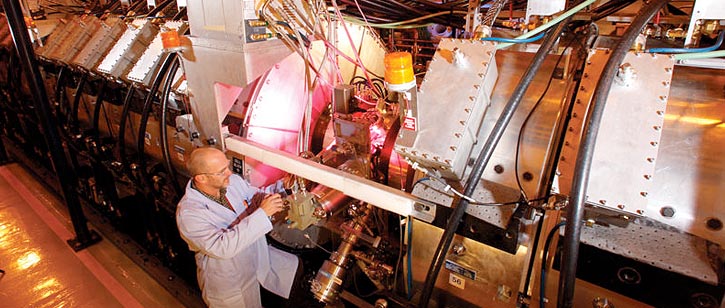Yesterday, my colleague Lisbeth Gronlund wrote about the unjust firing of James Doyle, a 17-year employee of Los Alamos National Laboratory. The PhD political scientist was fired over an academic article he wrote on his personal time—not as an official representative of the national lab—that argued for eliminating nuclear weapons. You can read more about the nuclear dimension of this story in that post, but here I’d like to make the point that the Department of Energy could have avoided this public embarrassment if it had enacted a strong scientific integrity policy from the outset.
The Department of Energy’s poor grade on scientific integrity

Despite having a more science-based mission, the Department of Energy has one of the weaker scientific integrity policies of federal agencies responding to President Obama’s directive on scientific integrity. Photo: DOE/Wikimedia Commons
At many federal agencies with a strong science focus, there are policies in place designed to prevent mishaps like Doyle’s. In fact, most science agencies you could think of—the EPA, NOAA, NSF, even the VA and the Marine Mammal Commission—have a policy that allows their employees to publish on their own time, provided they make clear they are not speaking for the agency and they do not release classified information. The NOAA Scientific Integrity Policy, for example, states,
NOAA scientists are free to present viewpoints, for example about policy or management matters, that extend beyond their scientific findings to incorporate their expert or personal opinions, but in doing so they must make clear that they are presenting their individual opinions—not the views of the Department of Commerce or NOAA.
The DOE, however, has no policy that even comes close to this. The DOE policy statement on scientific integrity is little more than three pages of regurgitation of the “Holdren memo” that instructed departments to create a scientific integrity policy to meet the president’s Inaugural pledge to restore science to its rightful place. The DOE policy states (emphasis mine):
Scientists employed directly as Federal employees at Department-owned-and-operated laboratories for the specific purpose of conducting research are encouraged to publish research findings in peer-reviewed, professional, or scholarly journals, subject to prior approval by their supervisor.
From the bolded text above, we find DOE’s policy is far more restricted in application than other agencies:
- It only applies to federal scientists (not non-scientist employees, nor federal contractors, such as Doyle).
- It only applies to DOE-operated laboratories—which excludes 16 of the 17 national laboratories (including Los Alamos) since they are contractor-operated.
- And most significantly, it requires employees to get supervisor approval and doesn’t clarify how the agency should distinguish their personal views from that of the DOE such as through a disclaimer.
It is easy to see how such a vague and narrow policy provided little to no protection for someone like James Doyle.
A chilling environment for DOE employees to publish
Because of the lack of guidance in DOE policy, its employees are left to discern for themselves what is appropriate in this space, and as a result, they are vulnerable to the kind of political moves that Doyle lost his job over. In this setting, many federal employees are likely to opt out of publishing or speaking altogether rather than risk their jobs over talking publicly about their science policy expertise.

Los Alamos National Laboratory is one of several DOE-owned facilities that work on nuclear weapons. Experts in these labs should be able to publish their views without facing retaliation from their employer. Photo: LANL
Perhaps because he thought a decision this rash was possible, Doyle did go the extra step and seek approval from DOE for his publication even though no such approval was officially required. The agency cleared his article and he was free to publish. (By the way, this fact is notable as several agencies have delayed or prevented their scientists from publishing in areas pertaining to their work if it has political implications.)
If anything, Doyle got more agency approval than necessary and still was fired when the DOE-approved content of his article was retroactively deemed classified. External experts have since assessed the content not to be classified, helping to make the case that this was in fact a strictly political move rather than a national security threat.
Federal employees should have a right to academic free speech
In addition to (ironically) drawing far more attention to Doyle’s article than it otherwise would have received, the incident showcases the desperate need for DOE to strengthen its policies around scientific integrity. Its scientists and other experts need clarity and guidance from their agency on issues of publishing and other public-facing outlets. They need their scientific free speech guaranteed in writing. This is good for the employees, good for DOE, and it is good for democracy.
When we have public discussions on complex science policy issues like nuclear weapons disarmament, don’t we want those with the most expertise to be a part of that conversation?
